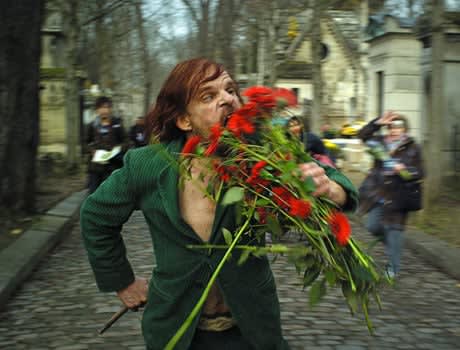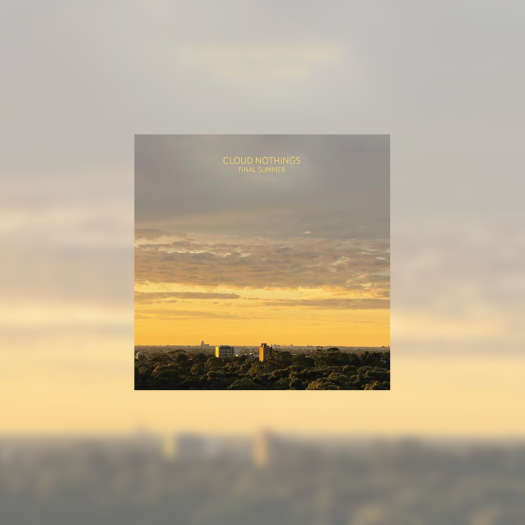A testament to the history of cinema, be it referential nods or oblique visual metaphors using specificities within the language of cinematic text, rendered lovingly with loaded, melding vignettes of various genres, Leos Carax's pseudo-surrealist, or at least abstract, puzzle, Holy Motors, deliberately asks its audience to see the forest for the trees.
In fact, this idiom opens the film, after an audience, enraptured in the experience of passive viewership, is presented within a dreamlike vacuum, above which Carax emerges from slumber, his finger a (or "the") key, opening a door in forest wallpaper (think Rosemary's Baby) to control and oversee the viewing experience.
From here, a man, referred to most commonly as Oscar (Denis Lavant), enters a limousine chauffeured by the elegant, older Céline (Edith Scob), where he proceeds to attend nine appointments throughout the day, Each one is indicative of a genre or style of classically constructed film that Carax is ultimately saying a prayer for in the medium's dying days.
Whether referencing himself, making nods to Lovers on the Bridge and recreating his "Merde" segment from Tokyo!, in primarily European (chiefly French) cinema, each segment, or appointment, starts without a setup and ends with Lavant leaving the scene as an actor having completed his job. Portraying him as an elderly woman, an emotionally abusive father, a dying man, a motion capture actor and even an assassin, Holy Motors showcases Lavant's flexibility and range throughout the manic, pointed tableaux, ranging from banal to melodramatic.
There is even a musical number that features Kylie Minogue crooning about lovers turned to monsters and good things passed, which transitions to a suicide as she sheds her wig and trench coat, revealing another character with a different agenda.
Reason and linearity aren't on Carax's agenda as we watch the many trees amidst a forest; rather, the aim is to romanticize the past with partial self-indulgence, suggesting that the digital era and micro-cameras are destroying the beauty of cinema. Even the limousines seem to be aware of the death of traditional filmmaking, after we're reminded of, and blinded by, the Georges Franju horror, Eyes without a Face (which incidentally featured Scob) and the domestic satire Max Mon Amour.
Though fascinating, albeit insular, it's difficult to ignore the notion that Carax is merely demonstrating a fear of change and a psychological inability to cope with the present by projecting a concept and an assertion that may very well be in his head. In fact, one could argue that Holy Motors is merely a complex, beautifully constructed testament to the intense defensiveness of the human ego.
(Mongrel Media)In fact, this idiom opens the film, after an audience, enraptured in the experience of passive viewership, is presented within a dreamlike vacuum, above which Carax emerges from slumber, his finger a (or "the") key, opening a door in forest wallpaper (think Rosemary's Baby) to control and oversee the viewing experience.
From here, a man, referred to most commonly as Oscar (Denis Lavant), enters a limousine chauffeured by the elegant, older Céline (Edith Scob), where he proceeds to attend nine appointments throughout the day, Each one is indicative of a genre or style of classically constructed film that Carax is ultimately saying a prayer for in the medium's dying days.
Whether referencing himself, making nods to Lovers on the Bridge and recreating his "Merde" segment from Tokyo!, in primarily European (chiefly French) cinema, each segment, or appointment, starts without a setup and ends with Lavant leaving the scene as an actor having completed his job. Portraying him as an elderly woman, an emotionally abusive father, a dying man, a motion capture actor and even an assassin, Holy Motors showcases Lavant's flexibility and range throughout the manic, pointed tableaux, ranging from banal to melodramatic.
There is even a musical number that features Kylie Minogue crooning about lovers turned to monsters and good things passed, which transitions to a suicide as she sheds her wig and trench coat, revealing another character with a different agenda.
Reason and linearity aren't on Carax's agenda as we watch the many trees amidst a forest; rather, the aim is to romanticize the past with partial self-indulgence, suggesting that the digital era and micro-cameras are destroying the beauty of cinema. Even the limousines seem to be aware of the death of traditional filmmaking, after we're reminded of, and blinded by, the Georges Franju horror, Eyes without a Face (which incidentally featured Scob) and the domestic satire Max Mon Amour.
Though fascinating, albeit insular, it's difficult to ignore the notion that Carax is merely demonstrating a fear of change and a psychological inability to cope with the present by projecting a concept and an assertion that may very well be in his head. In fact, one could argue that Holy Motors is merely a complex, beautifully constructed testament to the intense defensiveness of the human ego.




